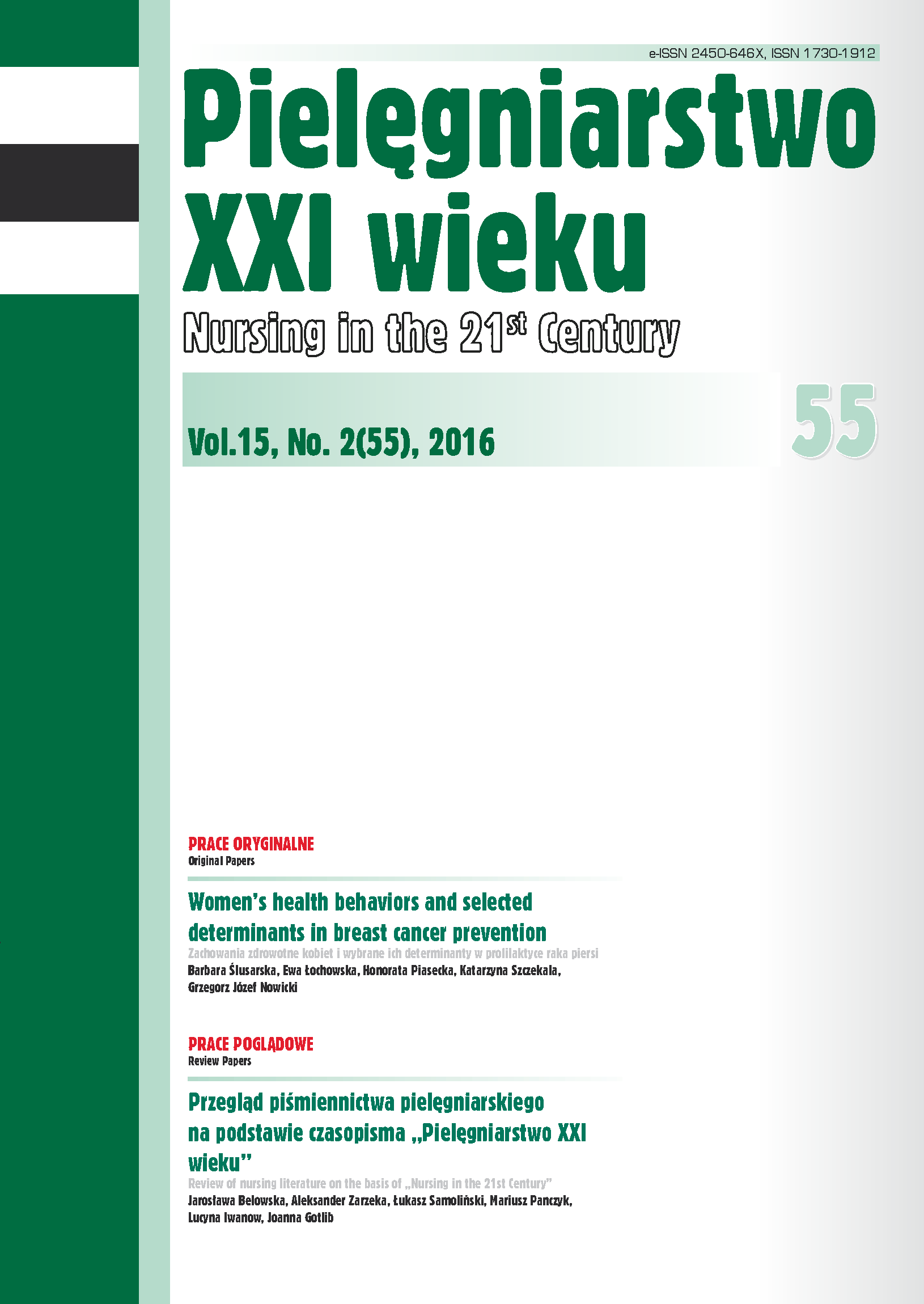Role of psychosocial resources and acceptance of disease in maintaining health with asthma
DOI:
https://doi.org/10.1515/pielxxiw-2016-0015Keywords:
asthma, health behaviours, acceptance of disease, support, self-efficacyAbstract
ROLE OF PSYCHOSOCIAL RESOURCES AND ACCEPTANCE OF DISEASE IN MAINTAINING HEALTH WITH ASTHMA
Introduction. Asthma is a chronic disease. Risky health behaviours among patients like exposure to allergens or stress, smoking, irregular drug taking, lack of physical activity can exacerbate the condition. Psychosocial resources, like self-efficacy, social support and patient’s acceptance of the condition may prove helpful in coping with the disease.
Aim. Investigating health behaviours among asthmatic patients, discussing psychosocial resources and assessing the degree of disease acceptance in order to account for the relationship between the latter two variables.
Material and methods. The study group included 100 patients suffering from asthma. A questionnaire designed especially for investigating that group of patients, as well as two standardized tools (the Acceptance of Illness Scale and the General Self-Efficacy Scale) were used. A chi-square test was used for performing a statistical analysis. the level of significance was set at p <0.05.
Results. Some 43% of patients assessed their acceptance of the condition as medium, while another 52% assessed their self-efficacy as average. Almost all respondents (91%) received support from their loved ones. Almost all admitted they engaged in some physical activity. Most respondents took drugs irregularly and were exposed to stress; more than a half declared exposure to allergens. The higher their self-efficacy was, the more likely they were to engage in sport activities. Self-efficacy and acceptance of the disease by respondents resulted in a significant decrease in asthma exacerbation incidence. The more support they received, the higher their acceptance of the disease was.
Conclusions. The respondents showed both positive and negative health behaviours. Self-efficacy was a significant predictor/indicator of physical activity only. There was a significant relationship between the support that the patients received and their acceptance of the disease.
References
1. Niżankowska-Mogilnicka E, Bochenek G, Gajewski P. Astma. [w:] Szczeklik A, Gajewski P, red. Choroby wewnętrzne. Kraków: Wydawnictwo Medycyna Praktyczna; 2010, s. 358-369.
2. Sveum R, Bergstrom J, Brottman G, et al. Diagnosis and Management of Asthma. ICSI 2012; 10: 1-86.
3. Nathan RA, Sorkness CA, Kosinski M, et al. Development of the asthma control test: A survey for assessing asthma control. J Allergy Clin Immun 2004; 113 (1): 59-65.
4. Kurowska K, Kuźba M. Wsparcie a radzenie sobie w chorobie przewlekłej na przykładzie nadciśnienia tętniczego. Nadcisn Tętn. 2011; 15(3): 177-183.
5. Filanowicz M, Cegła B, Szynkiewicz E, Dowbór-Dzwonka A. Akceptacja choroby jako predyktor zachowań zdrowotnych pacjentów chorych na astmę atopową. Probl Pielęg. 2013; 21 (1): 13-20.
6. Chodkiewicz J. Problem akceptacji choroby u osób uzależnionych od alkoholu. Znaczenie zasobów osobistych. Acta Univer Lodz. Folia Psychol. 2004; 8: 123-133.
7. Juczyński Z. Narzędzia pomiaru w promocji i psychologii zdrowia. Pracownia Testów Psychologicznych Polskiego Towarzystwa Psychologicznego, Warszawa 2001.
8. Kupryś-Lipińska I, Kuna P. Zmiany najnowszych Wytycznych Leczenia i Prewencji Astmy – GINA 2014. Na co powinniśmy zwrócić uwagę? Pneumonol Alergol Pol. 2014; 82: 393-401.
9. Małolepszy J, Dębowski T. Zaostrzenia astmy u dorosłych. Alerg Astma Immun. 2006; 11 (2): 67-75.
10. Lewandowska K, Specjalski K, Jassem E, Słomiński MJ. Styl radzenia sobie ze stresem a funkcjonowanie emocjonalne u chorych na astmę. Pneumonol Alergol Pol. 2009; 77 (1): 31-36.
11. Bilińska MM, Sitek EJ. Jakość życia i akceptacja choroby w miastenii. Post Psychiatr Neurol. 2007; 16: 139-143.
12. Basińska MA, Zalewska-Rydzkowska D, Wolańska P, Junik R. Dyspozycyjny optymizm a akceptacja choroby w grupie osób z chorobą Gravesa-Basedowa. Endokrynol Pol. 2008; 59: 23-29.
13. Basińska MA, Woźniewicz A. Inteligencja emocjonalna chorych na łuszczycę jako wyznacznik akceptacji choroby. Przegl Dermatol. 2012; 99: 202-209.
14. Ziętkowski Z, Skiepko R, Skiepko U. i wsp. Ocena poziomu i rodzaju aktywności fizycznej pacjentów z astmą. Alergoprofil 2013; 9 (2): 26-31.
15. Ziętkowski Z, Olędzki B, Ziętkowska E, Bodzenta-Łukaszyk A. Czy wysiłek fizyczny może korzystnie wpływać na przebieg astmy. Alerg Astma Immun. 2012; 17 (4): 162-164.
16. Schwarzer R, Fuchs R. Self-efficacy and Health Behaviours [w:] Conner M., Norman red. Predicting Health Behaviour, Open University Press, Buckingham-Philadelphia 1996, s. 163-196.
17. Żuralska R, Mziray M, Muczyn A, i wsp. Ocena związku między zachowaniami zdrowotnymi a poczuciem własnej skuteczności u pensjonariuszy Domu Pomocy Społecznej w Gdańsku. Probl Pielęg. 2012; 20 (2): 247-251.
18. Rusin-Pawełek E, Uchmanowicz I, Jankowska-Polańska B i wsp. Akceptacja choroby pacjentów chorych na astmę oskrzelową a kontrola astmy oskrzelowej. Alergol Info. 2012; 7 (3-4): 61-67.
Downloads
Published
Issue
Section
License
Copyright (c) 2016 Authors

This work is licensed under a Creative Commons Attribution-NonCommercial-NoDerivatives 3.0 Unported License.




